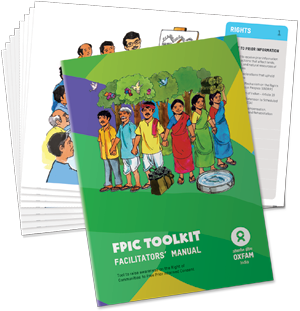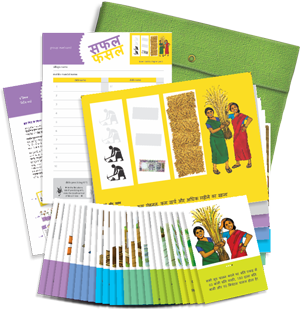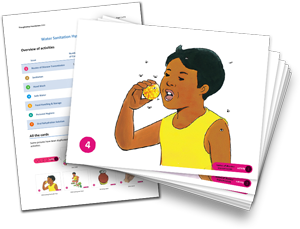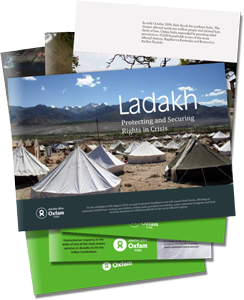This page is part of the legacy site, and is no longer being maintained. Some links may be broken. Please visit the new site here
work themes ☞ |
|
|
|
|
|
|
|
|
Free, Prior & Informed Consent (FPIC) It is estimated that 50 million people have been displaced due to “development projects” over 50 years in India [2011]FPIC is the principle that a community has the right to give or withhold its consent to proposed projects that may affect the natural resources they customarily own or use. FPIC is enshrined in international laws such as the UNDRIP. This toolkit draws from the experiences of rural / tribal communities and organisations in India who have fiercely struggled to protect their natural resources and their way of life against forces that subscribe to a conflicting version of development. The tool is designed to be used by specially trained facilitators to empower marginalised communities who are most at risk of being displaced. (Partner : Oxfam India, 2015) |

|
|
To mitigate the effect of climate change, and to ensure food security of tribal communities, CInI has been working across 8 states of central India to promote a new method of growing rice that produces higher yields at lower costs. This pictorial kit is designed to enable women farmer-groups to quickly adapt to the new method. It involves a game that helps women to discuss, remember, and prepare for, the crucial steps necessary for a good yield. (Partner : Cini, 2015) |

|
|
Nature Conservation Foundation's (NCF) goal is to contribute to the knowledge and conservation of India’s wildlife heritage with innovative research and imaginative solutions. The Early Bird Project, a part of NCF's Outreach & Education work, aims to facilitate a deeper connection with nature, by creating a variety of resources particularly for young people. TF helped design the visual Identity for the project, and design it's first toolkit; a set of 40 interactive picture cards to introduce birding to children. (Partner : Nature Conservation Foundation, 2014) |
|
Water Sanitation Community Kit This is a set of 56 flash cards and 5 banners, designed for use by field-workers engaged with flood prone communities. The cards, and the accompanying activity instructions have been adapted from watsan kit (2005) and PHAST Cards (2004). The attempt here was to create a comprehensive and updated library of images. The cards are organised into colour coded sets - to enable field workers to get started on specific issues at short notice, and carry few cards at a time. (Partner : Oxfam India, 2012) |

|
|
"In Search of Higher Ground" (film and publication 2008), "Reckoning with Aila" (2009), "Flood Response in South India", "Ladakh..." (2010) and "Coping with Climate Change" (2011) are overview reports on the relief and recovery work by Oxfam India partners in the wake of recent natural disasters in India. (Documentation, Editing & Publication Design
|

|
|
This kit has been designed primarily for use in rural schools, to discuss life saving issues related to water, sanitation and hygiene. The module helps participants to think about daily life and examine the need for behaviour change. (2005) |
|
The Participatory Hygiene And Sanitation Transformation method has been successfully to build community participation in Safe water and Sanitation projects. This set of cards were developed for pilot projects in Raghunathpur and Bolpur (Partner : GKW KFW PHED-West Bengal, 2004) |
Promoting the use of Bio gas in Kumaon Hills The project began with studying bio gas users in the Kumaon hills. This was done by living in Chamini village in the Kumaon hills and understanding the pros and cons of using bio gas as perceived by the villagers. A picture story book was developed dealing with the issues raised. This would be used by animators from the local NGO in convincing new users in the usefulness of bio gas. (Partner: Pan Himalayan Grassroots Development Foundation, Ranikhet, 1999) |
|
Safe Water and Sanitation, Kumaon Hills The project involved development of low cost communication aids
for distribution among village men and women in the Kumaon hills. (Developed for Pan Himalayan Grassroots Development Foundation, Ranikhet, 1998) |
Safe Water and Sanitation, Lucknow This was a pilot project on participatory, educational communication in rural areas. The resource was to be photographic slides which were a documentation of the work done by the Government of U.P. to provide safe drinking water and adequate sanitation facilities to the villages in U.P. (Supported by Project Support Unit Lucknow, 1992) |
|
|
This project has historic significance for us. It was launched in 1986 in Kolkata, long before the inception of Thoughtshop Foundation. The success of the campaign reaffirmed our belief that we could initiate radical positive social change. The campaign generated a public outcry against drugs and was widely reported. The concern generated led to laws being changed, and an Anti-drug Cell initiated by the Police. Many NGOs came forward to handle the issue and the media came forward to report it in a more informed and serious manner. (Supported by the Bengal Chamber of Commerce and Industries) |
© 2020 Thoughtshop Foundation [an error occurred while processing this directive] |